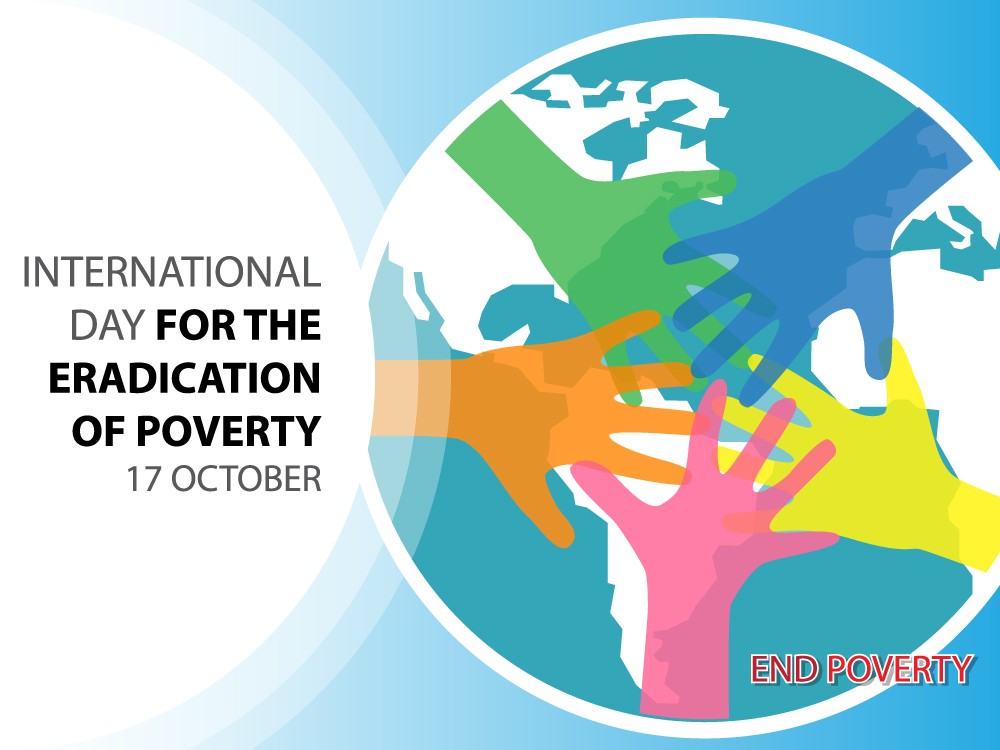October 17: International Day for the Eradication of Poverty- An Islamic Perspective on Ending Social and Institutional Maltreatment

The International Day for the Eradication of Poverty, observed annually on 17 October, serves as a powerful reminder of our collective responsibility to end social and institutional maltreatment and strive for just, peaceful, and inclusive societies. The theme for 2024, “Ending Social and Institutional Maltreatment: Acting Together for Just, Peaceful, and Inclusive Societies,” calls on all sectors—governments, civil society, and religious institutions—to work together to dismantle the structures that perpetuate poverty and inequality.
Poverty Facts and Figures- According to United Nations studies and estimates
- Extreme poverty is defined as surviving on less than $2.15 per person per day in 2017 purchasing power parity.
- By the end of 2022, 8.4% of the world’s population, or as many as 670 million people, were expected to be living in extreme poverty.
- An estimated 7% of the global population – around 575 million people – could still find themselves trapped in extreme poverty by 2030.
- In response to the cost-of-living crisis, 105 countries and territories announced almost 350 social protection measures between February 2022 and February 2023.
For Islamic communities, the eradication of poverty is not just a societal duty, but a spiritual obligation deeply rooted in the Quran and Hadith. The Quran repeatedly emphasizes the importance of charity (zakah and sadaqah) to support those in need, which serves as a pathway to purify wealth and foster social cohesion.
Quranic Teachings on Helping the Needy-
God calls upon believers to assist the poor and marginalized, as seen in the following verse:
مَثَلُ الَّذينَ يُنفِقونَ أَموالَهُم في سَبيلِ اللَّهِ كَمَثَلِ حَبَّةٍ أَنبَتَت سَبعَ سَنابِلَ في كُلِّ سُنبُلَةٍ مِائَةُ حَبَّةٍ ۗ وَاللَّهُ يُضاعِفُ لِمَن يَشاءُ ۗ وَاللَّهُ واسِعٌ عَليمٌ
“The example of those who spend their wealth in the way of God is like a seed [of grain] that sprouts seven ears; in every ear are a hundred grains. And God multiplies for whom He wills. And God is all-Encompassing and Knowing” (Al-Baqarah 2:261). This verse reminds us that wealth is not diminished by giving in the path of God but rather multiplied. The act of giving not only benefits the receiver but purifies the giver’s heart, reinforcing social solidarity.Another verse highlights the virtue of spending on those less fortunate:
وَآتِ ذَا القُربىٰ حَقَّهُ وَالمِسكينَ وَابنَ السَّبيلِ وَلا تُبَذِّر تَبذيرًا
“And give the relative his right, and [also] the poor and the traveler, and do not spend wastefully” (Al-Isra’ 17:26).This verse encourages Muslims to be mindful of their resources and ensure that they are used to benefit those who are deprived.
Hadith on Poverty and Generosity
The Prophet Muhammad (pbuh&hp) and the Imams from Ahl al-Bayt (p) emphasized the critical importance of addressing poverty, often warning against its dangerous consequences. The Prophet (pbuh&hp) famously stated:
كَادَ الْفَقْرُ أَنْ يَكُونَ كُفْراً
“Poverty is close to disbelief (kufr)” (Al-Kulayni, Al-Kafi, Vol. 2, p. 307, Hadith 4). Imam Ali (p) has spoken about the negative effects of poverty in several instances in Nahj al-Balaghah. In one instance, he describes poverty as a form of [gradual] death:
الْفَقْرُ، الْمَوْتُ الْأَكْبَرُ
“Poverty is the greatest death” (Nahj al-Balaghah, Wisdom 163).In another narration, Imam Ali (p) highlights the detrimental impact of poverty on a person’s character and their diminished role in social activities:
وَ الْفَقْرُ يُخْرِسُ الْفَطِنَ عَنْ [حَاجَتِهِ] حُجَّتِهِ، وَ الْمُقِلُّ غَرِيبٌ فِي بَلْدَتِهِ
“Poverty silences the sharp-witted from (presenting) their argument, and a poor person is a stranger in his own hometown” (Nahj al-Balaghah, Wisdom 3). In another hadith, Imam Ali (p) draws attention to the danger that poverty poses to a person’s faith and beliefs. He (p) advised his son, Muhammad ibn al-Hanafiyyah, saying:
وَ قَالَ (علیه السلام) لِابْنِهِ مُحَمَّدِ ابْنِ الْحَنَفِيَّةِ: يَا بُنَيَّ، إِنِّي أَخَافُ عَلَيْكَ الْفَقْرَ، فَاسْتَعِذْ بِاللَّهِ مِنْهُ؛ فَإِنَّ الْفَقْرَ مَنْقَصَةٌ لِلدِّينِ، مَدْهَشَةٌ لِلْعَقْلِ، دَاعِيَةٌ لِلْمَقْتِ
“O my son, I fear poverty for you, so seek refuge in God from it. Indeed, poverty diminishes one’s religion, confounds one’s intellect, and invites resentment” (Nahj al-Balaghah, Wisdom 319). This highlights the profound impact that financial hardship can have on one’s spiritual and intellectual well-being.
A Call to Action for the Muslim Ummah
In light of this year’s theme, Islamic teachings call for collective efforts to end institutional and social maltreatment. Acts of giving, whether through zakat, sadaqah, or waqf (endowments), are fundamental tools for alleviating poverty. These practices help uplift communities and restore the dignity of those who are oppressed by economic inequality.
Poverty eradication in Islam is about financial assistance and fostering inclusivity, justice, and peace. By supporting initiatives that aim to reform unjust institutions, we act in accordance with the teachings of Islam, ensuring that every individual is treated with dignity and fairness.
We are proud to announce that one of the ongoing activities of I.M.A.M., as an NGO founded on Islamic values, is providing financial assistance to many needy families throughout the United States year-round. The organization also extends its support to individuals affected by natural disasters such as hurricanes, floods, and earthquakes. Furthermore, I.M.A.M. actively supports local orphaned children and numerous global organizations and initiatives that focus on orphan care.
We call upon the Muslim Ummah to unite in the fight against poverty. It is our collective responsibility to share our blessings and work towards a future where all members of society can thrive without the constraints of economic hardship and injustice.Together, we can create a more inclusive and peaceful world, in line with the Quranic teachings and the guidance of the Ahl al-Bayt (p).
May God guide us in our efforts and accept our deeds.

Leave a Comment:
You must be logged in to post a comment.